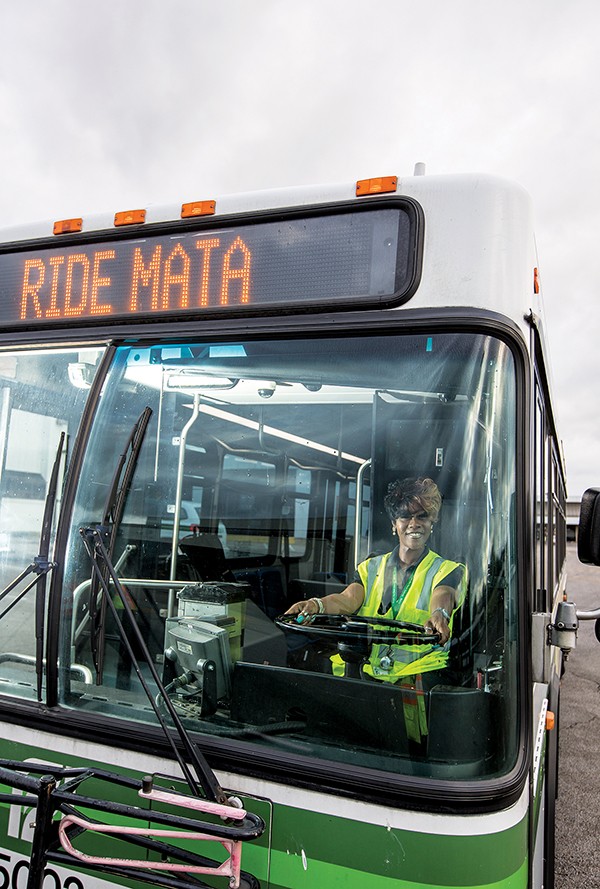Last spring I found myself in a position of unimaginable privilege. For the first time in my adult life, I had a car that worked and was paid off. No weird rattles, squeaking brakes, bald tires. I hate the term “adulting” for philosophical reasons, but it was one of those times in my life that made me think “so this is what it’s like.”
Then I started anticipating the inevitable break-in, wreck, or other misfortune that would set me back again and put me in my cosmic place. “Just watch,” I’d say. “Something’s going to fall out of the sky and land on my car because I don’t deserve this.”
A month later, as a chunk of road debris hurtled toward my windshield on I-40, I thought, “Well, there it is.”
 Justin Fox Burks
Justin Fox Burks
What’s the MATA?
The damage turned out to be minor, but being virtually carless for a couple weeks reminded me how difficult it is to thrive in Memphis without a vehicle. My home and my office are two miles apart, putting me on the road a grand total of 10 minutes a day. I know I have it easy. But I tried to plot a bus route home from work and MATA’s trip planner told me “LOL, walk” — which I did, a couple times. And let me tell you, it sucked! If that’s more optimal than the bus, we’ve got a problem with the bus.
I can shrug and catch an Uber, but someone who has to schlep across town for a $7.25-an-hour job does not have that luxury. The bus ride from Whitehaven to Downtown takes about an hour one-way, not including the wait. Anyone who doesn’t have access to a car has their opportunities limited by the number of hours in a day. I’m heartened by the county mayor’s commitment to transit equity, and I’d love to see MATA viewed less as the nuisance in the right lane on Poplar and more as a reliable way to get around. Improving and expanding service are obviously high priorities for increasing ridership, but there’s one more way to get people to hop on.
The New York Times last month published a story about a growing trend in cities that have seen bus ridership increase up to 60 percent. All they had to do was waive the fare. Should Memphis try something similar? Yes, it sounds counterintuitive, as the city and county look to infuse more money into MATA, not less. But public transportation can’t work unless it’s an option for everyone, versus the only option for some. There are two ways to do that: Make it convenient, and make it affordable. $1.75 a ride seems affordable, until you factor in the time investment and the fact that $70 a month does not fit everyone’s definition of “affordable.”
“Oh, but who will pay for it?” Let’s just get this out of the way: the same people who pay for every other public good. I have little patience for those who bristle at paying for services they don’t use, as if we could allocate our taxes to the projects we care about. I don’t have kids, and my house hasn’t burned down yet, but here I am, still dutifully paying for schools and the fire department. If you live in Cordova and have never seen a bus, I’m sorry to hear it — but you chose the Germantown Parkway lifestyle, friend. And you’re contributing to the road congestion and pollution that better public transit would solve.
Actually, that makes a pretty good case for a toll. How about, say, $1.75 each way for commuters on 240 and 385? While cities that waived bus fares saw an increase in ridership, they didn’t see a decrease in the number of cars on the road. This is because people who ride the bus generally don’t have cars. Such is the case in Memphis, where bus riders typically live in poorer neighborhoods. Why should they pay to be part of the solution?
In addition to the wheel tax the county commission is considering, there are other car-centric ways to fund free transit. On any given day in Midtown, the city could make a boatload ticketing cars parked illegally on the street — too close to the corner, in no-parking zones, in front of fire hydrants. Maybe some incentives could encourage businesses to dig in and support a transit fund. Who knows? It’s not impossible to make transportation a right, not a privilege.
Jen Clarke is a digital marketing specialist and an unapologetic Memphian.